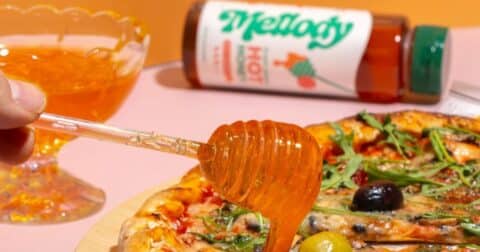Solutions
Cars Harm Animals — Could Wildlife Crossings Be a Solution?
Research•11 min read
Solutions
How plant-based honey could help save the most at-risk bees: native pollinators.


Words by Arundhati Nath
Bees play a vital role in pollination, which is essential to feeding a growing global population. In fact, in the United States alone, studies suggest that nearly one third of the entire food supply ecosystem depends on honeybees. Unfortunately, this crucial player in our food supply chain has been facing critical challenges. Commercial beekeeping, the use of pesticides and land degradation have negatively impacted bee demographics and led to the wiping out of other wild bee populations. This, among other factors, has caused an imbalance in the overall ecosystem. In 2016, 28 percent of bees were wiped out in the U.S. alone.
With the growing awareness of the detrimental environmental effects of commercial beekeeping, new research is emerging around how honey can be made without bees.
Stephen Buchmann is a pollination ecologist who has studied the behavior of bees for over 40 years. His research suggests that bees are sentient beings who can feel complex emotions like optimism or frustration, among others. This leads to ethical questions about their being farmed.
Bees are harmed in several ways during commercial beekeeping and typical honey production. Factory farms keep bees in unnatural conditions, and they are genetically manipulated. Bees are also exposed to harmful pesticides and subjected to stressful transportation. They might not receive adequate nutrition, owing to a lack of access to flowering plants.
While a few innovative brands have come up with honey substitutes using ingredients like maple syrup, cane sugar, apple juice or molasses, Melibio Inc claims to have manufactured the world’s first plant-based honey, Mellody. The honey is akin to lab-grown meat, in the sense that natural plant extracts are put through microbiological procedures in a lab to produce the honey. The product was formally launched in March last year, and is available for sale at certain outlets, as well as online.
Dr. Aaron M Schaller, CTO and Co-founder of MeliBio, Inc. credits the idea to the CEO and Co-founder, Darko Mandich. Mandich worked for almost eight years in the honey industry, and has seen the downsides of the commercial beekeeping industry — especially its impact on native bee populations.
Making Mellody meant forming a deep understanding of what honey essentially is, in terms of composition and characteristics. Bees collect the nectar from flowers and act on it with enzymes in their gut. “Bees transform the nectar by reducing the pH levels. The viscosity changes and it becomes honey,” Dr. Schaller explains.
For the food science team behind Mellody, it was about understanding what was in those plants that made honey special, and understanding the chemistry behind it.
“We’re talking about several medicinal and other compounds found in honey, such as polyphenols which are well known components of plants, chocolates or wine. These compounds add to the complexity of honey and other products,” Dr. Schaller says.
The next step involved a lot of formulation and experimentation in food science. The team had to identify which ratios of those compounds worked, and which did not. “There are thousands of compounds that you can gather from plants and arrive at different varieties of honey. It really was a huge project, involving a lot of formulations involving minor tweaks in different ingredients,” Dr. Schaller adds. MeliBio is currently experimenting with creating honey via a fermentation processes as well, but this is still in the research and development phase.
According to Grand View Research, the value of the global honey market was $9.01 billion in 2022, and is estimated to grow at a compound annual rate of 5.3 percent until 2030. While there are no well-defined reports to shed light on the vegan or alternative honey segment within the honey market, the demand is likely to increase with the popularity of veganism worldwide.
In 2021, the total amount of honey produced in the United States was around 126 million pounds, while the total honey consumption was approximately 618 million pounds. While raw honey is heavily imported from countries like India, Vietnam and Argentina, a part of the honey consumed in the U.S. is either vegan or alternative honey — or just plain sugar syrup.
Dr. Bruno Xavier, food scientist and Associate Director of the Cornell Food Venture Center, Cornell AgriTech says that there’s a clear indication that a large fraction of the honey consumed is fake — sugar syrups sold as honey. “If they can reduce the cost, plant-based honey brands can give people access to honey in a non-cheating way,” Xavier says.
The challenges of manufacturing honey from plant-based sources can be challenging; it largely depends on how closely one wants to replicate pure honey. More than 99 percent of honey is just a mixture of sugars and water, and that is relatively easy to mimic. But honey has an immense variety of components in smaller quantities.
“These micro components are crucial to the benefits that natural honey has, and these include anti-microbial components and enzymes that are very unique to honey. Adding all those components that pure honey has, including enzymes, could be hard to reproduce using artificial technologies,” Dr. Xavier says.
Challenges of plant-based honey alternatives also include making the consumer trust the brand, and convincing them that the product tastes, smells, and offers the same nutritional and health benefits as natural honey does.
After all, honey is a food product that has been used for more than 8,000 years by humans. “The challenge that honey-alternative brands will face is to show consumers that their product is not jeopardizing the health benefits that honey offers,” Dr. Xavier says.
Dr. Schaller adds that there’s also the general challenge of making a product from scratch and creating something entirely new. “You can’t really follow someone else’s footsteps if you’re the first one doing it.”